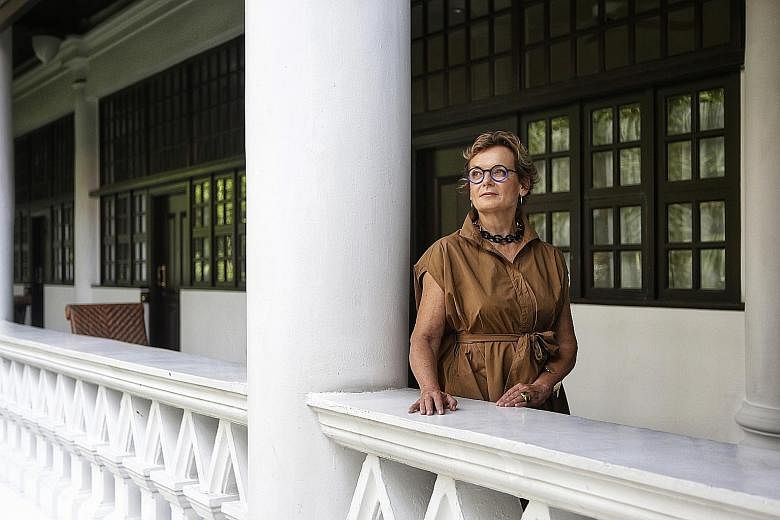Alexandra Champalimaud is a woman who wears many hats.
On the occupation front, she is a hospitality design guru, the brains behind some of the world's most luxurious hotels, including The Dorchester London, Four Seasons Hotel in Jakarta and, most recently, the Raffles Hotel Singapore, where she is heading the interior design revamp as part of the hotel's ongoing restoration and renovation work.
Her business card reads president and principal designer of Champalimaud Design, a firm she founded in Montreal, Canada, before she relocated to New York over two decades ago and where she is now based.
But above all, the designer, who is in her early 60s, is an observer - an attentive bystander who not only takes note of the bold and unmistakable, but also the finer details.
"In many ways, we are social anthropologists," she says, when asked how she and her team went about tackling the huge scope of the Raffles Hotel Singapore renovation works. "For us to create design that can add value and improve the space, we need to put ourselves in the middle of it all, to understand not only the history behind a place, but also what it is that people today are seeking from it."
As a designer, she has her finger on the pulse of the world - not only in the realm of design, but also that of travel, technology and the evolution of generations.
While speaking about the project's design process, she often delves into the changes she observes every day - that of a more savvy traveller, an increasingly technologically connected world and the fact that generations are now becoming more distinct and separate than ever before.
"What was evident when I first visited the hotel was that it had such incredible bones, but it was just tired and dated - which was expected given it had last been renovated nearly 30 years ago," she says. "Today's traveller, however, expects much more - not only just seamless and beautiful interiors, but also accessibility and efficiency. That was the update I felt the hotel needed."
She points to the hotel lobby as a key area she felt could offer so much more to the experience, given that a strategic use of the space could make it into a hub for social activity.
It was with this in mind that the new plans for the space involve more food and beverage options to shake up the vibe and atmosphere of the hotel, without requiring major changes to the structure.
Its Writers Bar, for example, one of the signature Raffles F&B spaces in the lobby area, is being upgraded with a larger space, a redesigned dark and luxurious interior and a full bar offering, complete with a menu of bespoke cocktails.
"We hope people will enjoy their drinks in this beautiful bar space and, also through the course of the night, spill out onto the terrace or into the lobby - it's an atmosphere we feel should and can be created organically and in a way that feels honest to the environment," she says.
The guestrooms were another feature the team put much thought into.
"In a way, the rooms were the most demanding to work on because there are a lot of paradoxes at play when designing a beautiful guestroom or bathroom," Champalimaud says. "For example, they need to be well lit, but also be able to shut out all light for people who cannot sleep with an iota of light at night.
"In a way, they should be reminiscent of the past, even while being entirely contemporary in the way they are built and function."
With these concerns in mind, the team designed the new suites with better soundproofed windows, strong wireless connection, mechanical blinds, improved lighting and discreet but accessible sockets.
What will not be changed, however, is the heritage and colonial feel of the space, which is why the signature tripartite parlour, sleeping area, bathroom layout in the rooms is being retained, as are charming elements such as the antique light switches.
Also woven through the hotel is that element of understated luxury - brought to life by beautiful tiles, classic palettes and an array of rich antique-style fabrics and leathers sourced from countries such as Italy, France and the United States.
Ultimately, for Champalimaud, the key was offering beauty and opportunity for the hotel and its guests, while retaining that Raffles DNA.
"For us, the desire was not to have a radical change, but to readapt, improve and embellish such that each space feels heartfelt and honest," she says.
"This hotel is unique in that it has so much universal appeal, despite being so pared back.
"We wanted to bring forth the culture, history and heritage and tell an authentic story through design, in a way that befits a landmark like the Raffles Hotel Singapore."


